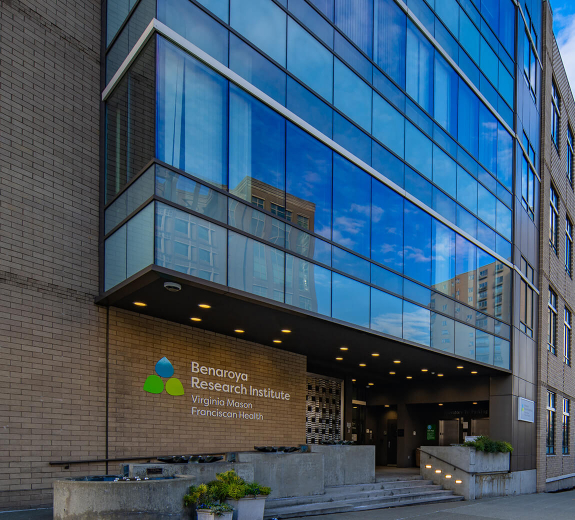BRI Receives $2.5 Million from National Institutes of Health
Benaroya Research Institute at Virginia Mason (BRI) received a new $2.5 million grant from the National Institutes of Health (NIH) to study the role of iron in the most common liver disease in the U.S., non-alcoholic fatty liver disease (NAFLD). Principal investigator for the grant is BRI clinical researcher Kris Kowdley, MD. Dr. Kowdley is also director of research and director of the Liver Center of Excellence at the Digestive Disease Institute at Virginia Mason Medical Center.
Up to 30 percent of people in the U.S. may be affected by NAFLD, and 3 to 4 percent may have a serious form of this disease called non-alcoholic steatohepatitis (NASH). Also, more than 2 million Americans are at risk of developing cirrhosis of the liver from this disease. NAFLD is a serious condition that occurs when too much fat builds up within the liver, in the absence of excessive alcohol use. This liver disease is associated with obesity, diabetes, elevated lipid levels, hypertension and cardiovascular disease. In some individuals, the accumulation of fat causes inflammation called steatohepatitis (NASH) that damages the liver. NASH is one of the leading causes of cirrhosis of the liver in the U.S. Liver disease also increases the risk of diabetes, cancer and heart disease.
Cirrhosis is a condition in which the liver becomes progressively scarred. With progressive cirrhosis, the liver is unable to function properly and a liver transplant may be needed.
"Our previous research suggests that one-third of Americans with NAFLD have iron deposits in the liver which may contribute to disease progression," said Dr. Kowdley. "There is an urgent need to understand the mechanisms leading to NASH, including the role of iron. Our goal is to understand the causes of this common but poorly understood liver disease in the hopes of developing new therapeutic interventions."
"NASH is an enormous public health concern and the number of Americans with this disease is growing," said Dr. Kowdley. "There are currently no FDA-approved therapies for this disease, although people can improve this condition by diet and lifestyle interventions. The need for research to find causes and cures for this disease is immediate."
Several new promising treatments are being studied via the NIH-funded Nonalcoholic Steatohepatitis Clinical Research Network (NASH CRN). Virginia Mason Medical Center is one of the participating centers and Dr. Kowdley is the principal investigator for the Seattle center. "Iron is essential for life, but extremely toxic in free form," he said. "Our hypothesis is that iron is the spark that accelerates the cascade of inflammation and injury that occurs in liver disease. This might pertain to certain people with a particular genetic make-up. If iron is playing a role in this disease, we can use methods to reduce iron and also determine genetic risk in patients who might develop the disease. This would assist in early diagnosis and treatment."
BRI and the Digestive Disease Institute at Virginia Mason conduct one of the largest liver research programs in the Northwest and are international leaders in the field.
About Digestive Disease Institute at Virginia Mason
The Digestive Disease Institute at Virginia Mason is internationally renowned for bringing accomplished specialists together to create personalized, comprehensive treatment plans and optimize patient care through innovations in research, education, and a multidisciplinary approach to treatment of digestive and liver diseases. The Digestive Disease Institute is ranked in the top 50 in the nation by U.S. News & World Report for gastroenterology. For more information, visit VirginiaMason.org/DDI.



